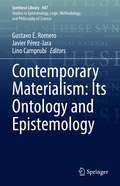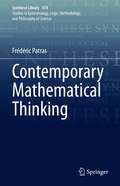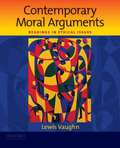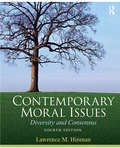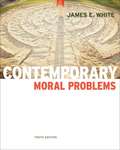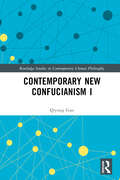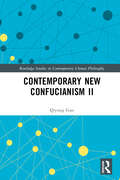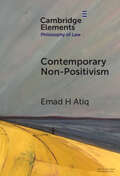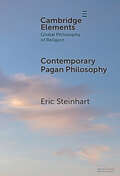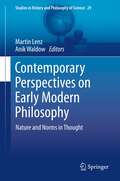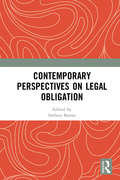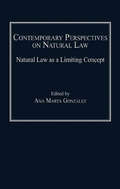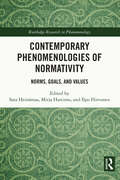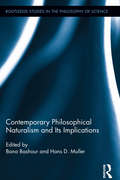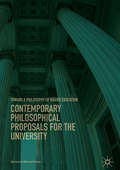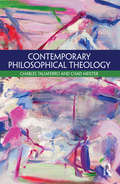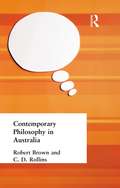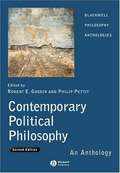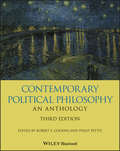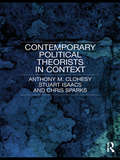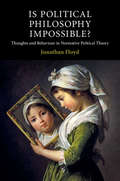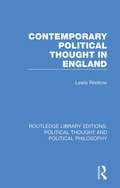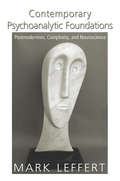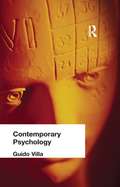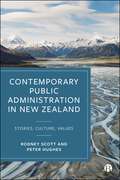- Table View
- List View
Contemporary Materialism: Its Ontology and Epistemology (Synthese Library #447)
by Lino Camprubí Gustavo E. Romero Javier Pérez-JaraThis book provides an up-to-date revision of materialism’s central tenets, its main varieties, and the place of materialistic philosophy vis a vis scientific knowledge.Materialism has been the subject of extensive and rich controversies since Robert Boyle introduced the term for the first time in the 17th century. But what is materialism and what can it offer today? The term is usually defined as the worldview according to which everything real is material. Nevertheless, there is no philosophical consensus about whether the meaning of matter can be enlarged beyond the physical. As a consequence, materialism is often defined in stark exclusive and reductionist terms: whatever exists is either physical or ontologically reducible to it. This conception, if consistent, mutilates reality, excluding the ontological significance of political, economic, sociocultural, anthropological and psychological realities. Starting from a new history of materialism, the present book focuses on the central ontological and epistemological debates aroused by today’s leading materialist approaches, including some little known to an anglophone readership. The key concepts of matter, system, emergence, space and time, life, mind, and software are checked over and updated. Controversial issues such as the nature of mathematics and the place of reductionism are also discussed from different materialist approaches. As a result, materialism emerges as a powerful, indispensable scientifically-supported worldview with a surprising wealth of nuances and possibilities.
Contemporary Mathematical Thinking (Synthese Library #474)
by Frédéric PatrasThis book deals with the evolution of mathematical thought during the 20th century. Representing a unique point of view combining mathematics, philosophy and history on this issue, it presents an original analysis of key authors, for example Bourbaki, Grothendieck and Husserl. As a product of 19th and early 20th century science, a canon of knowledge or a scientific ideology, mathematical structuralism had to give way. The succession is difficult, still in progress, and uncertain. To understand contemporary mathematics, its progressive liberation from the slogans of "modern mathematics" and the paths that remain open today, it is first necessary to deconstruct the history of this long dominant current. Another conception of mathematical thought emerged in the work of mathematicians such as Hilbert or Weyl, which went beyond the narrow epistemological paths of science in the making. In this tradition, mathematical thought was accompanied by a philosophical requirement. Modernity teaches us to revive it. The book is intended for a varied public: mathematicians concerned with understanding their discipline, philosophers of science, and the erudite public curious about the progress of mathematics.
Contemporary Moral Arguments: Readings in Ethical Issues
by Lewis VaughnMore than any other contemporary moral problems reader, Contemporary Moral Arguments focuses on the key arguments that have provoked the most debate in recent ethical issues. The book opens with two introductory chapters on critical reasoning and moral theory, which provide the basis for understanding and analyzing the arguments in the subsequent issues chapters (chs. 3-12). In the conventional way, these readings on ethical issues are sorted into 10 topical chapters covering issues such as abortion, sex and marriage, terrorism and torture, economic justice, etc. But the readings within these chapters are organized unconventionally, by argument. Each argument is introduced by a briefing that sketches the argument, provides conceptual background for it, and reviews some of the main philosophical responses to it. After the briefing come two to four essays presenting the classic statement of the argument, critiques and defenses of it, and discussions of related debates.
Contemporary Moral Issues (4th Edition): Diversity and Consensus
by Lawrence M. HinmanCombines arguments and personal narratives to introduce students to key issues in morality. Contemporary Moral Issues is an anthology that provides a selection of readings on contemporary social issues revolving around three general themes: Matters of Life and Death, Matters of Equality and Diversity, and Expanding the Circle, which includes duties beyond borders, living together with animals, and environmental ethics. Each set of readings is accompanied by an extensive introduction, a bibliographical essay, pre-reading questions, and discussion questions. Learning Goals Upon completing this book readers will be able to: Understand what the key contemporary issues in morality are Understand how these issues are encountered in everyday life Develop a critical position in regard to each of the readings
Contemporary Moral Problems
by James WhiteCONTEMPORARY MORAL PROBLEMS made available to provide readers with a brief anthology for the study of the ethics of war, terrorism, torture, and assassination. Supported with problem cases, an illuminating introductory essay, and study questions, this text will engage students in one of the most crucial moral debates of our time.
Contemporary New Confucianism I (Routledge Studies in Contemporary Chinese Philosophy)
by Qiyong GuoAs the first volume of a two-volume seminal work on contemporary New Confucianism in China, this book charts the development of this intellectual trend and examines four leading thinkers of this intellectual movement in the 20th century. Contemporary New Confucianism refers to the Confucianism or Confucian thought that has emerged in China since the 1920s and that seeks to revive Confucian spirituality in a changing society. This volume first analyzes the cultural context, logical approach, major themes, and problems of New Confucianism before delving into the four leading figures, namely Liang Shumin, Xiong Shili, Ma Yifu, and Qian Mu. The chapter on Liang Shumin analyzes his concept of will, his arguments on Confucian moral ideals, and his theory of culture. It then discusses Xiong Shili's contribution to the philosophical metaphysics of New Confucianism. The following chapter on Ma Yifu examines his theory of the mind, nature, and the six arts. The final chapter on Qian Mu presents his views on nationality, history, and the Chinese classics. This title will appeal to scholars and students of modern and contemporary Confucianism, intellectual history, philosophy and thought of contemporary China, and comparative philosophy.
Contemporary New Confucianism II (Routledge Studies in Contemporary Chinese Philosophy)
by Qiyong GuoAs the second volume of a two-volume seminal work on contemporary New Confucianism in China, this book focuses on six leading thinkers of this intellectual movement in the 20th century. Contemporary New Confucianism refers to the Confucianism or Confucian thought that has emerged in China since the 1920s, which aims to revive the spirituality of Confucianism in a changing society. This volume introduces the philosophical thought of Zhang Junmai, Feng Youlan, He Lin, Fang Dongmei, Tang Junyi, and Mou Zongsan, including Zhang's political philosophy and comparative philosophy, Feng's transformation of Chinese philosophy, He's idea of culture and "spirit-only idealism," Fang's comparative philosophy, Tang's idea of moral self and theory of human spiritual realms, and Mou's new ontology for Confucianism. It analyzes their divergences and the contemporary relevance of their thought in terms of revisiting and transforming traditional Chinese philosophy and reconciling Chinese and Western traditions. This title will appeal to scholars and students of modern and contemporary Confucianism, intellectual history, philosophy and thought of contemporary China, and comparative philosophy.
Contemporary Non-Positivism (Elements in Philosophy of Law)
by Emad H. AtiqThis Element defends and clarifies the thesis that the legality of a system of rules depends on its moral features. Positivists who deny this dependence struggle to explain: (1) the traditional classification of moral norms as a form of a priori law; (2) judicial reliance on moral norms in legal discovery; (3) persistent theoretical disagreement about intra-systemic, law-determining facts; (4) why radically arbitrary or immoral schemes of social organization represent borderline cases of law; and (5) why law, like other artifacts, can be evaluated in a kind-relative sense (“as law”). Meanwhile, traditional versions of non-positivism overstate the dependence going further than the desiderata warrant. A moderate theory is formulated: law is an artifact whose existence depends on adequately performing an essentially normative function. The theory's justification lies in its explanatory power: a comparison with other “value-driven” artifacts, such as artworks, proves vital for understanding legal language, reasoning, and practice.
Contemporary Pagan Philosophy (Elements in Global Philosophy of Religion)
by Eric SteinhartOne of the most remarkable features of the current religious landscape in the West is the emergence of new Pagan religions. Here the author will use techniques from recent analytic philosophy of religion to try to clarify and understand the major themes in contemporary Paganisms. They will discuss Pagan concepts of nature, looking at nature as a network of animated agents. They will examine several Pagan theologies, and Pagan ways of relating to deities, such as theurgy. They will discuss Pagan practices like divination, visualization, and magic. And they will talk about Pagan ethics. Their discussions are based on extensive references to contemporary Pagan writings, from many different traditions. New Pagan religions, and new Pagan philosophies, have much to contribute to the religious future of the West, and to contemporary analytic philosophy of religion.
Contemporary Perspectives on Early Modern Philosophy: Nature and Norms in Thought (Studies in History and Philosophy of Science #29)
by Martin Lenz Anik WaldowNormativity has long been conceived as more properly pertaining to the domain of thought than to the domain of nature. This conception goes back to Kant and still figures prominently in contemporary epistemology, philosophy of mind and ethics. By offering a collection of new essays by leading scholars in early modern philosophy and specialists in contemporary philosophy, this volume goes beyond the point where nature and normativity came apart, and challenges the well-established opposition between these all too neatly separated realms. It examines how the mind's embeddedness in nature can be conceived as a starting point for uncovering the links between naturally and conventionally determined standards governing an agent's epistemic and moral engagement with the world. The original essays are grouped in two parts. The first part focuses on specific aspects of theories of perception, thought formation and judgment. It gestures towards an account of normativity that regards linguistic conventions and natural constraints as jointly setting the scene for the mind's ability to conceptualise its experiences. The second part of the book asks what the norms of desirable epistemic and moral practices are. Key to this approach is an examination of human beings as parts of nature, who act as natural causes and are determined by their sensibilities and sentiments. Each part concludes with a chapter that integrates features of the historical debate into the contemporary context.
Contemporary Perspectives on Legal Obligation
by Stefano BerteaBringing together world-class scholars who have devoted themselves to the study of legal obligation, this book addresses key dimensions of the current debate: providing novel insights and perspectives, as well as critically discussing the leading theories of legal obligation. The notion of legal obligation is widely regarded as fundamental by both legal practitioners and legal theorists. For the language that explicitly refers to obligation is pervasive insofar as paradigmatic legal materials make reference to obligation either directly, by specifying what a subject is obligated to do, or indirectly, by attributing rights, privileges, powers, permissions, and other normative statuses to both single individuals and groups. There is, then, broad agreement that obligation constitutes a central element in legal studies. At the same time, however, there is considerable disagreement among contemporary legal theorists about how legal obligation can or should be elucidated. This book accounts for both the significance of obligation in law and the variety of views of legal obligation championed in legal philosophy today. With contributions from renowned theorists, this book will be invaluable for scholars and students of legal theory, legal philosophy, and jurisprudence.
Contemporary Perspectives on Natural Law: Natural Law as a Limiting Concept
by Ana Marta GonzálezResorting to natural law is one way of conveying the philosophical conviction that moral norms are not merely conventional rules. Accordingly, the notion of natural law has a clear metaphysical dimension, since it involves the recognition that human beings do not conceive themselves as sheer products of society and history. And yet, if natural law is to be considered the fundamental law of practical reason, it must show also some intrinsic relationship to history and positive law. The essays in this book examine this tension between the metaphysical and the practical and how the philosophical elaboration of natural law presents this notion as a "limiting-concept", between metaphysics and ethics, between the mutable and the immutable; between is and ought, and, in connection with the latter, even the tension between politics and eschatology as a double horizon of ethics. This book, contributed to by scholars from Europe and America, is a major contribution to the renewed interest in natural law. It provides the reader with a comprehensive overview of natural law, both from a historical and a systematic point of view. It ranges from the mediaeval synthesis of Aquinas through the early modern elaborations of natural law, up to current discussions on the very possibility and practical relevance of natural law theory for the contemporary mind.
Contemporary Phenomenologies of Normativity: Norms, Goals, and Values (Routledge Research in Phenomenology)
by Mirja Hartimo Sara Heinämaa Ilpo HirvonenThis volume investigates forms of normativity through the phenomenological methods of description, analysis, and interpretation. It takes a broad approach to norms, covering not only rules and commands but also goals, values, and passive drives and tendencies. Part I "Basic Perspectives" begins with an overview of the phenomena of normativity and then clarifies the constitution of norms by Husserlian and Heideggerian concepts. It offers phenomenological alternatives to the neo-Kantian and neo-Hegelian approaches that dominate contemporary debates on the "sources of normativity." Part II "From Perception to Imagination" turns to the normativity of three basic types of experiences. This part first sheds light on the normativity of perception and then illuminates the kind of normativity characteristic of imagination and drive intentionality. Part III "Social Dimensions" analyzes the norms that regulate the formation of practical communities. It takes a broad view of practical norms, discussing social and moral norms as well as the epistemic norms of scientific practices. By clarifying the divergences and interrelations between various types and levels of norms, the volume demonstrates that normativity is not one phenomenon but a complex set of various phenomena with multiple sources. Contemporary Phenomenologies of Normativity: Norms, Goals, and Values will be of interest to researchers and advanced students working on issues of normativity in phenomenology, epistemology, ethics, and social philosophy.
Contemporary Philosophical Naturalism and Its Implications (Routledge Studies in the Philosophy of Science)
by Bana Bashour Hans D. MullerOne of the most pervasive and persistent questions in philosophy is the relationship between the natural sciences and traditional philosophical categories such as metaphysics, epistemology and the mind. Contemporary Philosophical Naturalism and Its Implications is a unique and valuable contribution to the literature on this issue. It brings together a remarkable collection of highly regarded experts in the field along with some young theorists providing a fresh perspective. This book is noteworthy for bringing together committed philosophical naturalists (with one notable and provocative exception), thus diverging from the growing trend towards anti-naturalism. The book consists of four sections: the first deals with the metaphysical implications of naturalism, in which two contributors present radically different perspectives. The second attempts to reconcile reasons and forward-looking goals with blind Darwinian natural selection. The third tackles various problems in epistemology, ranging from meaning to natural kinds to concept learning. The final section includes three papers each addressing a specific feature of the human mind: its uniqueness, its representational capacity, and its morality. In this way the book explores the important implications of the post-Darwinian scientific world-view.
Contemporary Philosophical Proposals for the University
by Aaron Stoller Eli KramerThis edited collection brings together a robust range of philosophers who offer theoretically and critically informed proposals regarding the aims, policies, and structures of the university. The collection fills a major gap in the landscape of higher education theory and practice while concurrently reviving a long and often forgotten discourse within the discipline of philosophy. It includes philosophers from across the globe representing disparate philosophical schools, as well as various career stages, statuses, and standpoints within the university. There is also a diversity in method, approach and style, which varies from personal narratives and case studies, to philosophical genealogies, to traditional philosophical essays, and to systematic theories. The collection can serve as a theoretical resource for critically minded administrators and faculty who wish to analyze and change policies and structures at their home institutions. It will introduce them to a wide range of possible educational imaginaries, as well as provide them with productive suggestions for pragmatic change on campuses.
Contemporary Philosophical Theology
by Charles Taliaferro Chad MeisterIn Contemporary Philosophical Theology, Charles Taliaferro and Chad Meister focus on key topics in contemporary philosophical theology within Christianity, Islam, and Judaism, as well as Hinduism and Buddhism. The volume begins with a discussion of key methodological tools available to the philosophical theologian, such as faith and reason, science and religion, revelation and sacred scripture, and authority and tradition. The authors use these tools to explore subjects including language, ineffability, miracles, evil, and the afterlife. They also grapple with applied philosophical theology, including environmental concerns, interreligious dialogue, and the nature and significance of political values. A concluding discussion proposes that philosophical theology can contribute to important reflections and action concerning climate change.
Contemporary Philosophy in Australia
by Brown, Robert and Rollins, C DFirst published in 2002. Routledge is an imprint of Taylor & Francis, an informa company.
Contemporary Political Philosophy: An Anthology
by Philip Pettit Robert E. GoodinThis authoritative collection of the seminal texts in post-war political philosophy has now been updated and expanded. Reprints key articles, mainly unabridged, touching upon the nature of the state, democracy, justice, rights, liberty, equality and oppression. Includes work from politics, law and economics, as well as from continental and analytic philosophy. Now includes thirteen additional texts, taking account of recent developments in the field and reflecting the most pressing concerns in international affairs. Can be used alongside A Companion to Contemporary Political Philosophy (Blackwell Publishing, 1993; second edition in preparation) as the basis for a systematic introduction to the subject.
Contemporary Political Philosophy: An Anthology (Blackwell Philosophy Anthologies #1)
by Philip Pettit Robert E. GoodinThe revised and updated edition of Goodin and Pettit’s highly-acclaimed contemporary political philosophy anthology, bringing together the field’s most important readings in a single volume Unparalleled in the breadth and scope of its coverage, this newly-revised third edition traces the evolution of political philosophy as a contemporary practice, and raises important questions about the impact of current political events. Fully updated to include 49 contemporary and classic selections from the most distinguished scholars in political philosophy Offers expanded coverage of international affairs and political oppression Includes essays which represent a diversity of political and ideological positions, and features interdisciplinary voices in politics, law, and economics Edited by two of the field’s most highly-respected scholars The ideal collection of primary readings to accompany the Companion to Contemporary Political Philosophy, Second Edition (Wiley Blackwell, 2012) for coursework in political philosophy
Contemporary Political Theorists in Context
by Stuart Isaacs Anthony M. Clohesy Chris SparksThis exciting new textbook presents a clear framework for students to understand how themes and issues in political thought have emerged and developed throughout the 20th Century. Charting the progression from the preoccupation with the boundaries of the modern state, through to the current debates on rights, identity and justice; the three sections of the book enable the ideas of significant political thinkers to unfold through a telling of the key political events that gave a social context for their thought: Section I: The Inter-War Debate: Weber, Gramsci and Schmitt Section II: Post-War Debates: Arendt, Oakeshott, De Beauvoir and Adorno Section III: Contemporary Debates: Rawls, Nozick, Kymlicka and Foucault Written in an accessible and concise format, features include: 'rewind' and 'fast-forward' indicators to easily guide students around the text discussion points, revision notes and further reading in each chapter informative text boxes to highlight key concepts, people and events. By exploring an often ignored relationship in political thought, the influence of thought upon historical change and the influence of historical change upon theory, this text delivers new and exciting angles from which to approach politics today. Contemporary Political Theorists in Context is essential reading for all students of social and political theory.
Contemporary Political Theory: Thoughts and Behaviour in Normative Political Theory (Contemporary Political Theory)
by Jonathan FloydPolitical philosophy seems both impossible to do and impossible to avoid. Impossible to do, because we cannot agree on a single set of political principles. Impossible to avoid, because we're always living with some kind of political system, and thus some set of principles. So, if we can't do the philosophy, but can't escape the politics, what are we to do? Jonathan Floyd argues that the answer lies in political philosophy's deepest methodological commitments. First, he shows how political philosophy is practiced as a kind of 'thinking about thinking'. Second, he unpicks the different types of thought we think about, such as considered judgements, or intuitive responses to moral dilemmas, and assesses whether any are fit for purpose. Third, he offers an alternative approach - 'normative behaviourism' - which holds that rather than studying our thinking, we should study our behaviour. Perhaps, just sometimes, actions speak louder than thoughts.
Contemporary Political Thought in England (Routledge Library Editions: Political Thought and Political Philosophy #50)
by Lewis RockowFirst published in 1925. This book is a brief analysis of the historical relation of contemporary writers to their immediate predecessors. The author attempts to further a comprehensive summary of certain selected writers, with a criticism of their ideas, while in the last chapter an attempt is made at synthesis. Among those whose work is examined are Ramsay MacDonald, Bertrand Russell, Harold Laski, the Pauls, Hobhouse, Bryce, G. D. H. Cole, Norman Angell, etc. This title will be of great interest to students of politics, philosophy and history.
Contemporary Psychoanalytic Foundations: Postmodernism, Complexity, and Neuroscience
by Mark LeffertPast scholars have tried to classify psychoanalysis as an intrinsically positivist science, with varying degrees of success. Their critics have fared little better with narrow applications of postmodern thought, which focus on smaller areas within psychoanalysis and, as a result, neglect the evolution of the discipline as a whole. In an effort to provide a ground for current psychoanalytic thought, Mark Leffert creates an interreferential schema which balances the influences of postmodernism, complexity theory, and neuroscience as its key factors. Using the heterogeneity of postmodern thought as a starting point, he traces its impact on and implications for the development of the discipline, leading into the realm of complexity theory – which is relatively new to the psychoanalytic literature – and how it informs as well as constrains certain psychoanalytic assumptions. The book then turns to neuroscience, the "hard" scientific study of the complexities of the brain, and how recent research informs psychoanalytic theory and may shed light on aspects of memory, the conscious, and the unconscious. Taken together, these three elements create a firm basis for the current trends in psychoanalysis and the direction of its development in the years to come.
Contemporary Psychology
by Guido VillaFirst published in 2002. Routledge is an imprint of Taylor & Francis, an informa company.
Contemporary Public Administration in New Zealand: Stories, Culture, Values
by Peter Hughes Rodney ScottThis book provides an up-to-date account of New Zealand public administration, including insider stories of leading reform. Hailed for its distinctiveness and high performance, New Zealand’s radical public service reforms of the 1980s were studied, praised, criticised, and emulated around the world. However, New Zealand has not stood still. The 80s model had tremendous strengths, reducing some problems but also creating new problems and exacerbating others. More recent reforms layered cultural and behavioural approaches on top of earlier changes. This book, co-authored by the former head of the New Zealand public service, describes decades of change, what worked, what didn’t, and what challenges remain.
